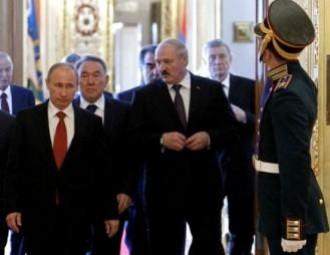Belarusan opposition disapproves of signing the EEU treaty

According to some of them, Eurasian Economic Union poses threat to Belarus' independence; others claim it will contribute to the stagnation of the Belarusan economy.
The signing the Eurasian Economic Union treaty has brought Belarus closer to loss of its sovereignty and to the destruction of the independence of the Belarusan state, Belarusan Christian Democracy (BCD) asserts.
The agreement signed in Astana will not benefit the Belarusan economy and will instead contribute to its stagnation, BCD says, adding that the deal runs counter to Belarus’ national security interests. Instead of diversifying its foreign economic and political ties, the authorities are making Belarus even closer attached to Russia, de facto turning it a satellite of the new Russian empire, BelaPAN cites the statement issued by the Belarusan Christian Democracy (BCD) on May 29.
According to Aliaksei Janukevich, chairman of the Belarusan People's Front (BPF), the EEU treaty constitutes a threat to the well-being and independence of Belarus and a barrier to its democratisation.
“The membership of Belarus in yet another integration entity does not meet Belarusan national interests”, Belsat quotes the words of Janukevich. The chairman of the BPF believes that the EEU can “damage the economy of Belarus and severely compromise the living standards of all our compatriots”.
Only the Russian economy stands to gain from the deal made in Astana, which gives Russia unimpeded access to Belarus' labor market and economic resources, Janukevich says, adding that “the aggressive Russian oligarchic capital, a weapon in the hands of modern Russian imperialism, may ruin Belarus' national business sector”.
Aliaksei Janukevich also predicts a rise in the prices of consumer goods and shortages of cheap quality goods from outside of the EEU and describes the Eurasian Union as a union of undemocratic regimes and warns that Belarus' membership in it will lead to the 'conservation' of its authoritarian regime.
Political analyst Yury Shautsou describes signing of the EEU Treaty as a last-minute decision. “The final text was discussed at the last minute, - he says. - If you paid attention to Belarus’ official statements yesterday, it was not clear whether Lukashenka would sign the agreement or not.”
That is why the public had no access to the document, Euroradio reports Shautsou’s words.
As “EuroBelarus” Information Service has earlier reported, the Treaty on the Formation of the Eurasian Economic Union was signed in Astana on May 29 by the presidents of Belarus, Kazakhstan and Russia. The Union is expected to come into existence on January 1, 2015. Belarusan parliament has already announced that it is planning to ratify the treaty on establishing the EEU at the earliest possible date.
-
03.01
-
07.10
-
22.09
-
17.08
-
12.08
-
30.09








































